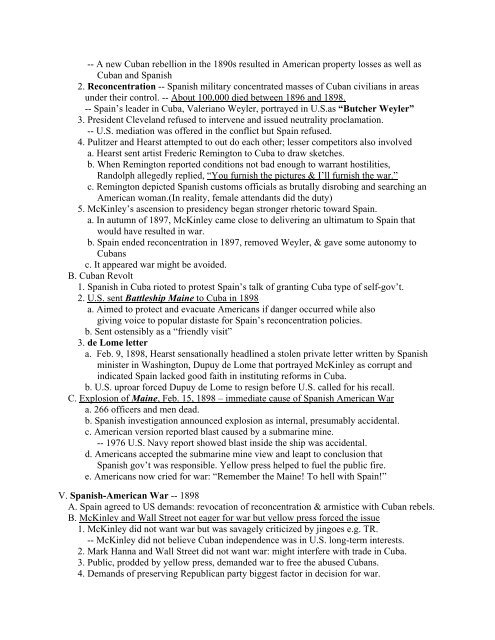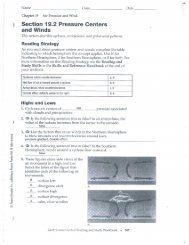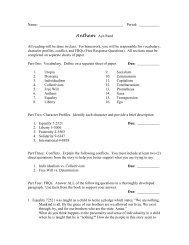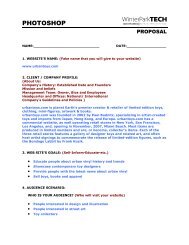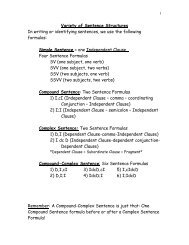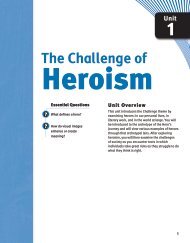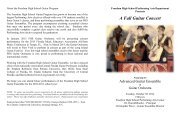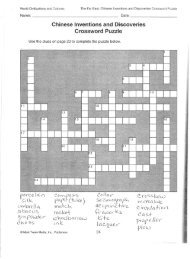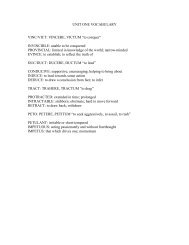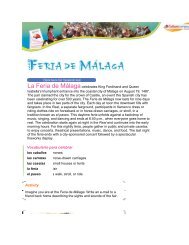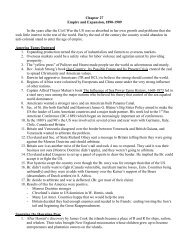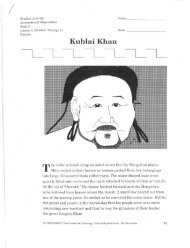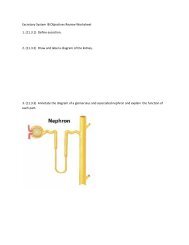Imperialism Notes 1890-1913
Imperialism Notes 1890-1913
Imperialism Notes 1890-1913
Create successful ePaper yourself
Turn your PDF publications into a flip-book with our unique Google optimized e-Paper software.
-- A new Cuban rebellion in the <strong>1890</strong>s resulted in American property losses as well as<br />
Cuban and Spanish<br />
2. Reconcentration -- Spanish military concentrated masses of Cuban civilians in areas<br />
under their control. -- About 100,000 died between 1896 and 1898.<br />
-- Spain’s leader in Cuba, Valeriano Weyler, portrayed in U.S.as “Butcher Weyler”<br />
3. President Cleveland refused to intervene and issued neutrality proclamation.<br />
-- U.S. mediation was offered in the conflict but Spain refused.<br />
4. Pulitzer and Hearst attempted to out do each other; lesser competitors also involved<br />
a. Hearst sent artist Frederic Remington to Cuba to draw sketches.<br />
b. When Remington reported conditions not bad enough to warrant hostilities,<br />
Randolph allegedly replied, “You furnish the pictures & I’ll furnish the war.”<br />
c. Remington depicted Spanish customs officials as brutally disrobing and searching an<br />
American woman.(In reality, female attendants did the duty)<br />
5. McKinley’s ascension to presidency began stronger rhetoric toward Spain.<br />
a. In autumn of 1897, McKinley came close to delivering an ultimatum to Spain that<br />
would have resulted in war.<br />
b. Spain ended reconcentration in 1897, removed Weyler, & gave some autonomy to<br />
Cubans<br />
c. It appeared war might be avoided.<br />
B. Cuban Revolt<br />
1. Spanish in Cuba rioted to protest Spain’s talk of granting Cuba type of self-gov’t.<br />
2. U.S. sent Battleship Maine to Cuba in 1898<br />
a. Aimed to protect and evacuate Americans if danger occurred while also<br />
giving voice to popular distaste for Spain’s reconcentration policies.<br />
b. Sent ostensibly as a “friendly visit”<br />
3. de Lome letter<br />
a. Feb. 9, 1898, Hearst sensationally headlined a stolen private letter written by Spanish<br />
minister in Washington, Dupuy de Lome that portrayed McKinley as corrupt and<br />
indicated Spain lacked good faith in instituting reforms in Cuba.<br />
b. U.S. uproar forced Dupuy de Lome to resign before U.S. called for his recall.<br />
C. Explosion of Maine, Feb. 15, 1898 – immediate cause of Spanish American War<br />
a. 266 officers and men dead.<br />
b. Spanish investigation announced explosion as internal, presumably accidental.<br />
c. American version reported blast caused by a submarine mine.<br />
-- 1976 U.S. Navy report showed blast inside the ship was accidental.<br />
d. Americans accepted the submarine mine view and leapt to conclusion that<br />
Spanish gov’t was responsible. Yellow press helped to fuel the public fire.<br />
e. Americans now cried for war: “Remember the Maine! To hell with Spain!”<br />
V. Spanish-American War -- 1898<br />
A. Spain agreed to US demands: revocation of reconcentration & armistice with Cuban rebels.<br />
B. McKinley and Wall Street not eager for war but yellow press forced the issue<br />
1. McKinley did not want war but was savagely criticized by jingoes e.g. TR.<br />
-- McKinley did not believe Cuban independence was in U.S. long-term interests.<br />
2. Mark Hanna and Wall Street did not want war: might interfere with trade in Cuba.<br />
3. Public, prodded by yellow press, demanded war to free the abused Cubans.<br />
4. Demands of preserving Republican party biggest factor in decision for war.


